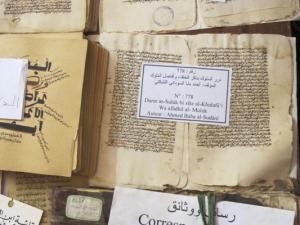Scientists worry about safety of literary gems in Timbuktu
By Peter Fabricius
The ancient African manuscripts of Timbuktu seem to have survived the capture of the city at the weekend by Tuareg and other rebels trying to topple the new military government of Mali. Rantobeng Mokou, SA’s ambassador to Mali, said last night he had spoken to people in Timbuktu who told him the rebels had stolen cars, money and other goods from the SA-sponsored library holding many of the manuscripts. But he said they told him the manuscripts themselves had not been damaged so far. There are about 300 000 manuscripts, most written in Arabic script and some dating back to the 14th century, in Timbuktu on the fringes of the Sahara. For the past decade, the SA government has been contributing to the international effort to preserve, store and catalogue the manuscripts.

Mokou said there were no South Africans working at the library. None of the Malian staff had been injured in the rebel takeover of the city and the library itself had not been damaged and was continuing to operate. Only one person, a Malian soldier, had been killed in the fall of the city. He had been shot accidentally. Professor Shamil Jeppie, who heads the Timbuktu Manuscripts Project at UCT, which is studying the manuscripts, had expressed concern earlier yesterday about the fate of the documents. He said he had been unable to reach anyone in Timbuktu by phone or e-mail to discover if the manuscripts were safe. But he added that it was not the first time Tuareg rebels had captured Timbuktu. The last time had been in 1992 and they had not damaged any of the manuscripts. He proposed that the SA government should get involved in trying to mediate a peaceful resolution to the Mali crisis.
One of the key themes of the project to preserve and study the manuscripts is the debunking of the myth that it was European colonialism that brought literature to Africa. Timbuktu was once one of Africa’s pre-eminent centres of scholarship. It is estimated there are some 300 000 manuscripts – texts on law, medicine, astronomy, literature, philosophy, philology and linguistics and many copies of the Qur’an – in all manner of collections. Only some 20 000 of them have been catalogued. Written in Arabic text – the Latin of the time – most of them are in the Arabic language itself, but many of them are in north-west African languages such as Songhay, Fulfulde, Tamasheq and Hausa. Some of these documents may be the earliest examples of these African languages as written languages. The bulk of this extraordinary heritage is imperilled by the unsuitable conditions under which the paper manuscripts are kept. Tackling this threat, on three fronts, is the chief goal of SA’s multimillion-rand involvement in Mali: Jeppie’s UCT project to digitise and translate and analyse selected documents; the National Library’s project to train Malian conservators to preserve individual manuscripts, and a project to build a new library in Timbuktu. The combined initiative arises from President Thabo Mbeki’s visit to Mali in 2001.
source: Originally published by The Star